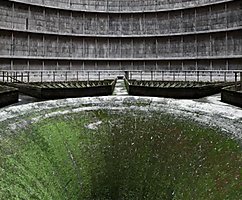"Island Time Forgot"
 Bashny.Net
Bashny.Net
The nature of the island of Chiloe different rare unspoilt beauty. The local population calls itself chilotami, has a unique culture and way of life is unusual. What is the reason for this peculiarity - in the geographical isolation or bizarre twist of history - hard to say. All of these factors are, and the consequences for a long time and are closely intertwined.
The island is home to a special kind of brown foxes, mountain monkeys, opossums Chilean long-nosed shrew, pygmy deer Pudu (the smallest in the world - their height 35-45 cm), songbirds, woodpeckers, great patagoniyskie - knock on their beaks can be heard at a distance of 100 m many other animal species. On the coast and nearby islands - rookeries of fur seals and penguins colony - there are two types of breeding these birds - Magellan penguins and Humboldt penguins. In the coastal shingle can see them nest and chicks huddled in the "nursery" in anticipation of the parents who went for feed.
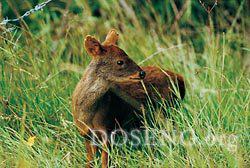
Europeans first saw Chiloe in 1540 aboard Korablin. Eighteen years later, the island was declared a possession of Spain, and in 1567 it built the first city - the port of Castro. But to get to the little colony and maintain constant communication with her Spanish was difficult Chiloe remained "edge of the world", and after the uprising of the Mapuche Indians on the continent - and at all was in the two centuries of isolation.
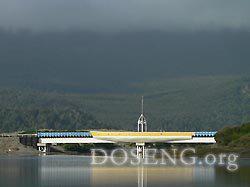
Potatoes - the basis of the local cuisine on the island, there are 286 varieties of it. According to numerous assumptions, it is the birthplace of Chiloe "second bread", but the Chilean scientists are objective above patriotic passions - and as a more reasonable versions push the origin of potatoes from Peru, Argentina and Bolivia.
Wooden religious architecture unique to all of Latin America - is clear on the appearance of Chiloe churches due to the abundance of wood as a building and finishing material. By the way, the wooden churches in Chiloe built without a single nail - a similar technique was used by architects of Russia.
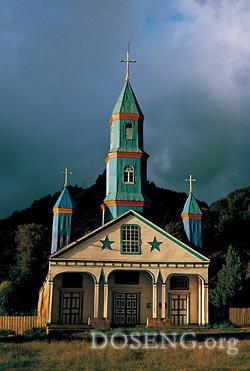
The mythology of the island is quite bizarre: it demonstrates once again the vitality of pagan beliefs - maybe because the myths are similar outlook chilotov.
Fanciful myths about scary or funny creatures seem absurd, but the reality often confirms these peculiar tales, formed in ancient times. So, in 2004, the giant squid are voracious flooded waters of Chiloe, arranging hunting for fish: cephalopod literally hundreds crowded the shores of the island. The face of these huge creatures with tentacles meter, beak-shaped noses and eyes the size of a plate, glancing from the deep sea, is quite consistent with the local legends about sea monsters. The horror that they have imposed on fishermen, and amazement that experienced scientists, is quite consistent with the emotions of sailors of past centuries who saw in the ocean of unknown forces games fabulous monsters. The superiority of the forces of nature, as in past times, there were fishermen lost their catch and squid is absolutely not affected - chilotskoy in the kitchen do not use them.
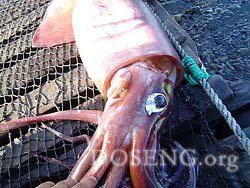
However, the myths - is not the only feature of mentality chilotov. Perhaps the most interesting feature of their ideology and way of life - is the unity with nature, which in itself makes human life bright and genuine. As he wrote in his book "The Way of whales" native of the island, Francisco Coloane "in Chiloé, where so choppy sea and the sky, every day, unlike yesterday."
The island is home to a special kind of brown foxes, mountain monkeys, opossums Chilean long-nosed shrew, pygmy deer Pudu (the smallest in the world - their height 35-45 cm), songbirds, woodpeckers, great patagoniyskie - knock on their beaks can be heard at a distance of 100 m many other animal species. On the coast and nearby islands - rookeries of fur seals and penguins colony - there are two types of breeding these birds - Magellan penguins and Humboldt penguins. In the coastal shingle can see them nest and chicks huddled in the "nursery" in anticipation of the parents who went for feed.

Europeans first saw Chiloe in 1540 aboard Korablin. Eighteen years later, the island was declared a possession of Spain, and in 1567 it built the first city - the port of Castro. But to get to the little colony and maintain constant communication with her Spanish was difficult Chiloe remained "edge of the world", and after the uprising of the Mapuche Indians on the continent - and at all was in the two centuries of isolation.

Potatoes - the basis of the local cuisine on the island, there are 286 varieties of it. According to numerous assumptions, it is the birthplace of Chiloe "second bread", but the Chilean scientists are objective above patriotic passions - and as a more reasonable versions push the origin of potatoes from Peru, Argentina and Bolivia.
Wooden religious architecture unique to all of Latin America - is clear on the appearance of Chiloe churches due to the abundance of wood as a building and finishing material. By the way, the wooden churches in Chiloe built without a single nail - a similar technique was used by architects of Russia.

The mythology of the island is quite bizarre: it demonstrates once again the vitality of pagan beliefs - maybe because the myths are similar outlook chilotov.
Fanciful myths about scary or funny creatures seem absurd, but the reality often confirms these peculiar tales, formed in ancient times. So, in 2004, the giant squid are voracious flooded waters of Chiloe, arranging hunting for fish: cephalopod literally hundreds crowded the shores of the island. The face of these huge creatures with tentacles meter, beak-shaped noses and eyes the size of a plate, glancing from the deep sea, is quite consistent with the local legends about sea monsters. The horror that they have imposed on fishermen, and amazement that experienced scientists, is quite consistent with the emotions of sailors of past centuries who saw in the ocean of unknown forces games fabulous monsters. The superiority of the forces of nature, as in past times, there were fishermen lost their catch and squid is absolutely not affected - chilotskoy in the kitchen do not use them.

However, the myths - is not the only feature of mentality chilotov. Perhaps the most interesting feature of their ideology and way of life - is the unity with nature, which in itself makes human life bright and genuine. As he wrote in his book "The Way of whales" native of the island, Francisco Coloane "in Chiloé, where so choppy sea and the sky, every day, unlike yesterday."
Tags
See also
Japanese delicacies for thrill-seekers
Unusual creatures of our planet
Vegans waiting deficit B12? Lies!
Quokka or short-tailed kangaroo
Scientists have solved the mystery of the kiwi bird
Frilled shark - a living fossil (16 photos + video)
Tips for Weight Loss
Rare animals of America
Travel to Cuba.


